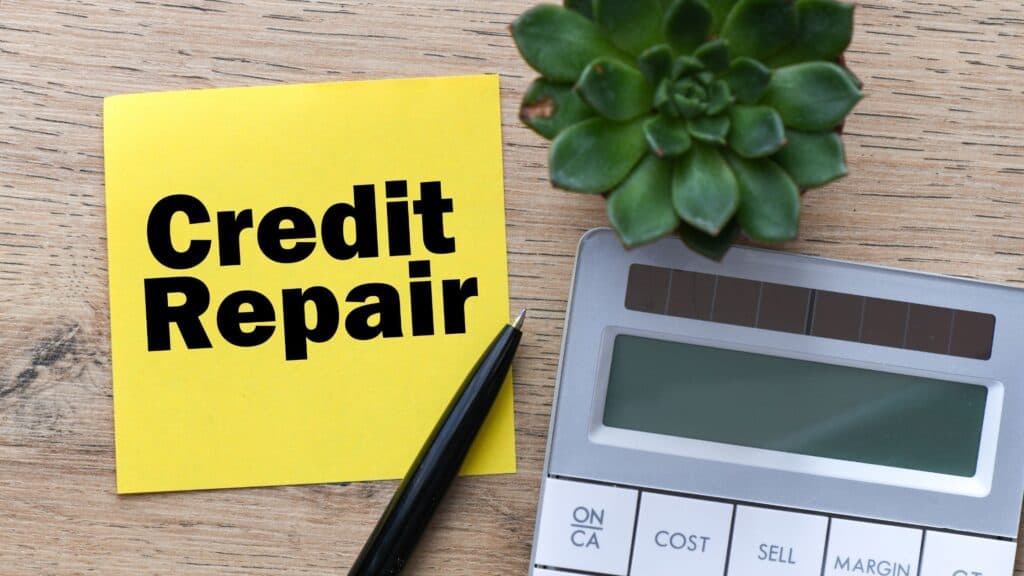In this age of the internet, it is crucial that businesses know how to repair business credit score.
This is because businesses often rely on banks and other financial institutions to provide loans for their business.
A good credit score is important for a business because it will affect their ability to get loans or credit cards.
It will also affect how much they pay in interest rates and how much they can borrow. A bad credit score will make it difficult to get loans or even a job.
Want to know more about how to repair business credit?
Stick around with me in the sections below and let’s get straight into business:
Not everyone is given the prospect to become wealthy in later life. Why not begin right away by clicking on my link below:
What Is A Business Credit Score?
A business credit score is a number that represents the creditworthiness of a business. This score is calculated based on the company’s financial information, such as the amount of money they owe, their cash flow, and their profitability.
The higher your business credit score, the better your chances will be to receive loans and financing at a lower interest rate. It also means that you are more likely to get approved for bank accounts and other services.
What Is A Business Credit Report?
A business credit report is a consumer report that provides information on the credit history of a business.
It contains information about the business’s past and current financial status, including any loans, bankruptcies, foreclosures, judgments or liens.
Businesses can request their own credit reports to learn more about their credit rating and to compare it with other businesses in the same industry.
The purpose of these reports is to provide businesses with an understanding of how they are perceived by creditors and other lenders.
The reports also provide valuable information for businesses that are considering applying for financing or loans because they will be able to evaluate their chances of being approved before they apply.
What Are The Importance Of Regularly Monitoring Your Business Credit Score?
Monitoring your business credit score is important because it tells you how much risk you pose to creditors and lenders.
It also allows you to take steps to improve your rating if necessary by following these 5 tips:
· Check Your Report At Least Once A Year, Or More Often If There Is A Change In Your Financial Situation.
· Pay All Bills On Time.
· Keep Balances Low On Revolving Accounts.
· Don’t Open Too Many New Lines Of Credit.
· Ask For Corrections If There Are Errors On The Report.
Check Your Report At Least Once A Year, Or More Often If There Is A Change In Your Financial Situation.
Monitoring your credit score is a good way to make sure that you stay on top of your financial situation. If there are any changes in your financial situation, you will be able to see it in your credit report.
More expensive than gold are your ideas. Use my link here to setup a business online to put them to good use:
Pay All Bills On Time.
Regularly monitoring your business credit score can help you to pay all bills on time, which will give you peace of mind.
With the help of a credit monitoring service, you can stay up-to-date with your business’s credit report and make sure that it is accurate.
Keep Balances Low On Revolving Accounts.
Regularly monitoring your business credit score is important because it helps you keep balances low on revolving accounts.
This is important because it can help prevent the interest from piling up and hurting your bottom line.
Not To Open Too Many New Lines Of Credit.
Regularly monitoring your business credit score can help you not to open too many new lines of credit.
It is important to monitor your credit score because it is often used by lenders to determine eligibility for loans and other financial products.
If you find that your business credit score has dropped, then it may be time to take a look at what may have caused the drop in your score.
Monitoring your business credit score on a regular basis will help you keep track of how it is trending over time and if there are any patterns that may indicate a problem.
Ask For Corrections If There Are Errors On The Report.
Monitoring your credit score is a great way of knowing if there are errors on your report and if there are, you can request for corrections.
The best part about monitoring your credit score is that it is free and takes just a few minutes of your time.
It’s not only about spotting errors on your credit report but also analyzing the information to see if any changes need to be made in order to maintain a healthy financial status.
For example, if you have too many accounts with high balances, or too many inquiries in the past year, then you should take steps to reduce these factors before they become problems.
Why Is Repairing A Business Credit Score Important?
Business credit score is a measure of the risk that a company poses to lenders. A low credit score can make it difficult for a business to get loans and other forms of financing.
The main reasons for repairing a credit score are:
· Lenders may refuse to provide financing.
· The cost of borrowing money is higher than what it should be.
· Businesses with low credit scores are often not considered for government contracts or other types of public funding opportunities.
· The company’s access to capital will be limited, which will affect its ability to grow and innovate.
To improve your life, you will really need money. Why don’t you establish a successful online business using my link below:
What Are The Common Reasons For Negative Detail On Business Credit Score?
A negative detail on a business credit score is a negative event that has happened to the business. These events can range from things as simple as not paying a bill on time, to more serious issues like bankruptcy or lawsuits.
The 10 Most Common Reasons For Negative Detail On Business Credit Are:
· Late Payments.
· Bankruptcy.
· Lawsuits.
· Tax Liens.
· Foreclosure.
· Judgments.
· Collection Accounts.
· Charge-Offs.
· Public Records Of Any Kind.
· Personal Bankruptcy.
Late Payments.
Late payments are the most common reason for a business to have negative information on their credit score.
Late payments will cause a company’s credit history to be identified as “delinquent” and this will show up on a business credit report. A late payment is defined as any payment that is 30 days past due or more.
The most common reason for late payments is that the customer didn’t have enough funds in their account at the time of purchase, but there are other reasons too.
Another reason for late payments could be that the customer thought they had enough funds in their account but it turns out they were wrong because of an error with their bank or card issuer.
The last and least common reason for late payments is when there has been an error with the company’s billing system which led them to charge customers incorrectly.
Late payments can cause negative details on a business credit score which can lead to problems with future loans and financing opportunities, not being able.
Bankruptcy.
The bankruptcy of a business will leave a negative mark on its credit score and may make it difficult for the company to get loans in the future.
Disclosure: Your intention to buy a paid version via my affiliate link here will allow me to earn money at no cost to you. Keep in mind that I am here to help you make good and more money online and will only recommend products or services that can help you reach a good life and income in the future.
Are you ready to take the next step? Go here.
This is because when you have a bankruptcy on your record, your credit score will drop dramatically.
The bankruptcy will stay on your credit report for up to 10 years and it can affect any future applications for loans or lines of credit.
Lawsuits.
A lawsuit can have a negative impact on a company’s credit score. The company’s credit score can be negatively impacted by the amount that they are being sued for, the number of lawsuits they are currently involved in, and how long the lawsuit has been going on.
The level of risk associated with a business is based on its debt-to-asset ratio and its net profit margin.
When these two ratios are high, it means that the business is more likely to be able to pay back their debts and maintain profitability.
Tax Liens.
Tax liens are a negative detail on a business credit score.
A tax lien is the act of filing a notice of the government’s intent to seize property or money from someone who owes taxes.
When you have a tax lien, it means that the IRS has filed an official notice saying that they want to seize your property or money because you owe back taxes.
The IRS will only file this notice if you owe more than $10,000 in unpaid taxes and have not paid them for at least 180 days.
If someone files a tax lien against your property, it will stay on your credit report for seven years and can lower your credit score by as much as 100 points.
Foreclosure.
Foreclosure is the process of relinquishing ownership of a property. It can happen as a result of missing mortgage payments or not being able to afford the property anymore.
When this happens, the lender will initiate foreclosure proceedings and take over ownership of the property.
This can have a negative impact on your business credit score because it will show up on your credit report as one of your late payments.
Judgments.
Judgments are a negative detail on your business credit score. They’re one of the most common reasons for a low credit score, and they can also be one of the most damaging.
Judgments are an entry in your credit report that tells creditors you owe money to someone else.
When you don’t pay back what you owe, the creditor can take legal action by suing you in court and winning a judgment against you.
The judgment will then show up on your credit report as an unpaid debt, which is bad news for your business credit score.
Money alone is not enough, but it’s obviously better than nothing. Equipped to accept money. Go here.
Collection Accounts.
Collection accounts, also known as delinquent accounts, can cause a business credit score to drop.
This is because collection accounts are considered a negative detail on your business credit report.
Collection accounts are often created by companies that are owed money and then turn the account over to a third-party collections agency.
The company will then charge interest and fees while they try to collect the money owed by the debtor.
Collection accounts can be damaging to your business credit score because they are considered a negative detail on your report.
If you have any collection accounts listed, it’s important to take care of them before they become too large and affect your credit score.
Charge-Offs.
A charge-off is a negative detail on a business credit score that can be brought about by the lender, who has given up hope of repayment.
A charge-off is the last resort for a creditor to recover what they are owed. The creditor may have tried other methods, such as collection and legal action, but found them to be unsuccessful.
When a charge-off happens, it is recorded on the credit report of the company or individual in question as an unpaid debt.
This will lead to negative details on their business credit score. It will also cause their personal credit score to decrease as well.
Public Records Of Any Kind.
The public records can cause negative details on a business credit score and it is important to take care of these records.
This is because if the public records are not taken care of, they can affect the business credit score. If a company has a good credit score, it will be able to borrow money from lenders at lower rates and also get better deals on things like insurance.
Public records are often overlooked by many people but they can have an effect on your business credit score.
This is why it’s important to take care of these records so that they don’t affect your business’s credit rating.
If you have a good credit rating, you’ll be able to borrow money from lenders at lower rates and also get better deals on things like insurance.
Personal Bankruptcy.
Personal bankruptcy is a high-risk, high-reward strategy for people who are in debt. It can be risky because it can cause you to have negative details on your credit score.
If you file for personal bankruptcy, it will stay on your credit report for 10 years.
The bankruptcy will stay on your credit report and affect your ability to get loans or lines of credit with the bank.
This is because the bank views it as a sign that you are not reliable with finances and they don’t want to take any risks with lending money to someone who may not pay back their debts in time.
You should indeed find time for yourself and your family. That is why you will certainly require some cash. If you’re looking to earn some money, open the link below.
This can have a bad effect on your business because if you need to borrow money from another financial institution, they may be reluctant to give you the loan if they know about the bankruptcy filing.
How Long Will It Take To Repair A Business Credit Score?
The length of time it will take to repair your business credit score depends on what caused the low score in the first place, how long ago it happened, and how much you have paid off since then.
For example, if you recently applied for a loan and were denied because of a low credit score, it will take less time than if you had been denied for other reasons.
If you have been denied for other reasons, such as bankruptcy or not enough payments made over a period of time, it could take up to six years or more before your credit rating improves significantly.
However, if you have just been turned down for a loan application due to insufficient funds.
How To Repair Business Credit Score.
Business credit score is an important metric that lenders use to decide whether or not to give a loan to a business.
There Are Three Main Ways Of Repairing Your Business Credit Score:
· Paying Your Bills On Time.
· Keeping Debt Low.
· Creating A Positive Cash Flow.
Paying Your Bills On Time.
Paying your bills on time is one of the most important things you can do to maintain a good credit score.
You can also improve your credit score by paying off debts and taking out loans responsibly.
If you have a good credit score, it will make it easier for you to get a loan or lease an apartment.
With a bad credit score, you may not be able to get any loans or leases at all.
It is important to note that if you don’t pay your bills on time, this will have an adverse effect on your business’s credit score.
Furthermore, if your business doesn’t have any debt or takes out loans responsibly then this will also have an impact on the business’ credit rating as well.
Keeping Debt Low.
One of the main factors that can affect your business credit score is the amount of debt you have. As a business owner, it is important to keep your debt low and this can help to repair your credit score.
Here Are Some Ways You Can Keep Your Debt Low:
· Keep an eye on how much you’re spending and make sure that you’re not overspending.
· Make sure that you are paying off all debts on time.
· Check for any opportunities that allow you to buy items with 0% interest rates or purchase them with cash so that there is no need for a credit card.
· Find out if there are any loans available from banks or through the government, which may be able to help with some of your company’s needs without having to use a credit card.
Building an income-generating business is the best approach to avoiding from rat race of the this life. To swiftly launch a thriving online business, use this link below.
Creating A Positive Cash Flow.
In order to repair your business credit score, you need to create a positive cash flow. This will help you in many ways.
You will be able to get loans and other financial products that you need for your business.
The first step is to create a cash flow forecast for the next 12 months.
This will help you plan your budget and track the money that comes in and goes out of your company.
It will also give you an idea of how much money is available at any given time, which is very important when it comes to making payments on time and maintaining a positive cash flow.
FAQ On How To Repair Business Credit Score.
In this section, I will answer all the frequently asked question repairing business credit score.
What Is A Personal Credit Score?
A personal credit score is a number that is generated by a credit bureau, which indicates the risk that a person poses to creditors.
The score is based on the person’s past credit history and their current financial status.
What Is The Difference Between A Business Credit Score And A Personal Credit Score?
A business credit score is calculated from the data available from public records such as tax returns, court records, filings with government agencies etc.
On the other hand, a personal credit score is calculated based on your individual financial history such as your payment history, length of time at current address etc.
What Are The Most Important Factors In A Business Credit Score?
There are many factors that contribute to a business credit score, including the following:
· Age Of The Company.
· Total Amount Of Debt.
· Length Of Time In Business.
· The Number And Type Of Trade References Used.
How Often Should I Check My Credit Report?
You should check your credit report at least once a year to make sure it’s accurate. You can also request one from each of the three major bureaus (Equifax, Experian, TransUnion) every 12 months for free.
How Do I See My Own Credit Report?
You can request your free annual report from each of the three major bureaus: Equifax, TransUnion, and Experian. You can also purchase your reports for a fee from these companies or other providers like Credit Karma or Quizzle.
What Are The Different Types Of Credit Scores?
There are 2 main types of credit scores: FICO and VantageScore. FICO is the most popular scoring model in the United States, while VantageScore is more popular in Canada and Europe. There are also specialty scores such as K-score, which rates a person’s ability to pay off their student loans.
What Is Credit Reporting?
Credit reporting is the process of collecting and storing information about an individual’s credit history.
The credit reporting system is a way for creditors to identify borrowers who are likely to repay loans and be good customers. This process can help people get loans, find jobs, buy homes or even rent apartments.
Executive Conclusion On Business Credit Report.
Improving your credit score is not an easy task. It takes time, patience and a lot of hard work. But the benefits are worth it.
Living after 65 years might be difficult at times. If you want to retire without worrying about the future, you should consider trying to start your own online business through my link below:
A good credit score can give you a competitive advantage when you are looking for a loan or an investment, as well as help you get better interest rates on your loans, lower insurance premiums and even save on monthly utility bills.
Guess you have seen it all and is super charged to make good use of the information provided inside this guide of mine.
Please let me hear your views about my post in the sections below.
Thanks for passing by and do enjoy the rest of the day/night.







